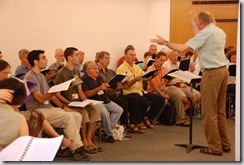[this is a version of a post which first appeared on my blog From the Front of the Choir]
The Sing Up programme for schools was set up by the UK government in January 2007 and was funded by them until April 2012. Their aim is to “give every child the chance to sing, with opportunities to develop their singing and performance skills.”

There appears to be an abundance of singing schemes aimed at schools, children and ‘youth’ in general – and even for old people – but what about the rest of us?
It seems to me that the Sing Up programme is another case of pendulum swinging: there was once vibrant music provision in schools (at least there was when I was a kid in the 50s and 60s) which has since been cut back, and now the government want to re-instate it.
But how will this affect the place of music in people’s lives as they get older? It’s all very well pumping money and effort into kids’ time at school, but what then? Why don’t people keep singing through their 20s and 30s?
All that money and effort goes into introducing young people to music, then they’re left to their own devices when they leave school. Choirs are often seen as fuddy duddy and formal, and evening classes are for grown ups (besides, who wants to go back to studying so soon?!), so those in their 20s and 30s often let singing go.
There are youth orchestras, youth bands, youth choirs, young people’s workshops, song writing initiatives for young people, studios for kids, etc. But then what? Once you reach your 30s, you’re out in the cold.
The government would have us believe that the dark ages of music and singing in schools is over. No more: “Stand at the back and mime”, or “You’re not good enough to be in the choir”. Singing in schools is now assumed to create confident singers. There is plenty of singing provision which is supposed to turn us into a singing nation.
But us Natural Voice Practitioners still get people coming to us who were thoroughly put off by their experience of music teaching in schools – even people in their 20s and 30s. Have things changed that much?
Most people who attend choirs and singing workshops that I run are 50+. Many is the time that someone has come up to me after a workshop and told me that it’s the first time that they’ve sung since they left school all those years ago? I always wonder why that is. How come they’ve left singing that long even though they enjoyed it?
It could be argued that singing in a group is just not cool enough for young people once they’ve left school. But what about the pop role models of boy and girl bands singing in harmony? And how come that when people eventually do come back to singing, they say how much they’ve missed it? Is there anything we can do about these ‘dark years’ when we stop singing?
There are so many initiatives these days for specific, well-defined groups like the young, the disadvantaged and the old. But what about people who don’t fit into any of these categories?
The Alzheimer’s Society provides a service called Singing for the Brain to help those with dementia. Age UK (formerly Age Concern) run Singing for Fun groups across the country for those aged 50 and over.
There doesn’t seem to be any support though for the huge majority of people in between: from 20 to 50s, say. It’s hard to get funding for this group as it’s not seen as a priority area. Money is pumped into schools, but then people stop singing. What can we do about it?
Do drop by, leave a comment and give me your ideas.
You might also like to read: Why do kids stop singing when they grow up?
Chris Rowbury
website: chrisrowbury.com
blog: blog.chrisrowbury.com
Facebook: Facebook.com/ChrisRowbury
Twitter: Twitter.com/ChrisRowbury